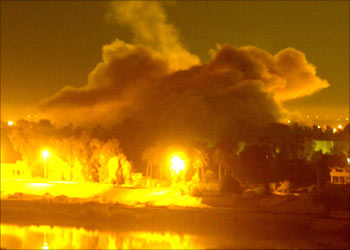
Suicide bomber kills 18 south of Baghdad
(Reuters)
12 February 2005
BAGHDAD - A suicide car bomber killed 18 people near a hospital south of Baghdad on Saturday in the second such attack in as many days, as violence surged after Iraqs election and ahead of a big Shiite religious festival.
The bomber drove his vehicle towards local government offices and a hospital in the town of Musayyib, southwest of Baghdad, but detonated it outside blast walls protecting the buildings and killed civilians in the street, local police said.
Around 25 people were wounded, doctors and police said, and US troops quickly moved in to seal off the area.
Violence has ratcheted up after a brief lull following landmark elections that were held nearly two weeks ago but whose final results have yet to be declared.
Two attacks on Friday targeted Shiite Muslims and appeared designed to fuel sectarian tension ahead of the Shiite festival of Ashura that climaxes on Feb. 19. Most of Iraqs insurgents are thought to be Sunni Muslims.
In those attacks, a suicide bomber killed at least 13 people and wounded more than 40 outside a mosque in a town northeast of Baghdad and gunmen killed nine people at a bakery in Baghdad.
Violence also erupted on Saturday in the southern city of Basra, where masked gunmen assassinated a senior judge as he drove to work, a Reuters witness and doctors said. The judges driver was seriously wounded.
It was the citys second assassination in a week and the latest in a string of targeted killings to scar the country.
Last week gunmen killed a correspondent for al-Hurra, a US-funded Iraqi television network, as he was leaving his house. His three-year-old son was also killed.
Gunmen have repeatedly targeted justice officials over the past year, with several judges and employees of the justice ministry killed in drive-by shootings and assassinations.
The shootings appear to be part of attempts to disrupt Iraqs criminal justice system as it struggles to regain its footing following the overthrow of Saddam Hussein.
RUMSFELD VISIT
The renewed violence came as US Defence Secretary Donald Rumsfeld made an unannounced visit to Iraq on Friday and warned that it would take some time for Iraqi security forces to crush the insurgency gripping the country for nearly two years.
Concerned to prevent a wave of bloodshed coinciding with Ashura, the interim government has said it will seal all borders between Feb. 17 and Feb. 22 to stop pilgrims flooding into Iraq.
Last year during Ashura, which honours the martyrdom of Imam Hussein, the grandson of the Prophet Mohammed, in 680 A.D., suicide bombers blew themselves up among crowds of Shiite pilgrims in Baghdad and Kerbala, killing 171.
The resumption of near-daily suicide attacks is a blow to hopes among some officials that the Jan. 30 election, which saw millions of Iraqis go to the polls in defiance of insurgent threats, might mark a turning point in the violence.
But US and other officials have cautioned that there would be no quick end to the insurgency after the election, saying violence could even increase in the short term as militants try to retaliate for the polls success and punish participants.
Counting of ballots is still going on. Final results are expected in the next few days, although electoral officials say more time will be required to certify them.
A religious-based coalition blessed by Iraqs foremost Shiite cleric, Ayatollah Ali al-Sistani, has a commanding lead, with around half the 4.6 million votes so far tallied.
A coalition of Kurdish parties is in second place and a bloc led by interim Prime Minister Iyad Allawi is third.
If the Shiite coalition wins, as widely expected, it would put Iraqs 60 percent Shiite majority in power for the first time, after decades of oppression under Saddam Hussein, a Sunni.
Attacks slowed after the ballot, but suicide bombs in Baghdad, Baquba and Mosul since then have killed more than 60 police, soldiers and would-be recruits to the security forces.









0 Comments:
Post a Comment
<< Home